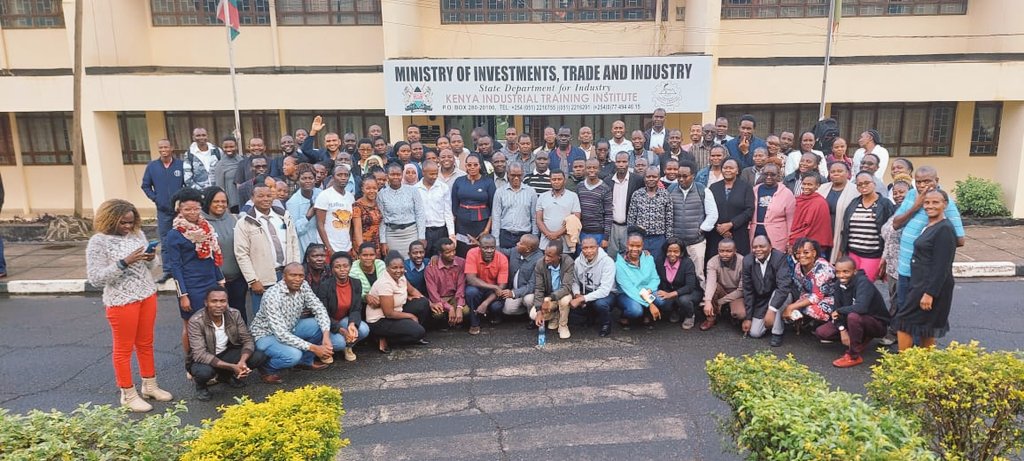Kenya Industrial Training Institute (KITI), located along Nakuru-Solai Road in Nakuru County, is a premier Technical and Vocational Education and Training (TVET) institution under the Ministry of Investments, Trade, and Industry. Established in 1965 with support from the Japanese government, KITI has grown from a 3-acre facility in Nakuru’s Industrial Area to a 40-acre campus, offering market-driven industrial and entrepreneurial skills training. With eight departments and state-of-the-art facilities, KITI trains artisans, craftsmen, technicians, and entrepreneurs for employment in industries or self-employment, contributing to Kenya’s Vision 2030 and rural industrialization. This article provides a detailed overview of the 11 courses offered for the 2025/2026 academic cycle, admission requirements, career prospects, and why KITI is a top choice for technical education.
Why Choose Kenya Industrial Training Institute?
KITI’s strategic location, 3 km from Nakuru town, and its focus on hands-on training make it a leading TVET institution. Here’s why KITI stands out:
- Accreditation: KITI is registered with the Technical and Vocational Education and Training Authority (TVETA) under license TVETA/PUBLIC/TVC/0006/2017 and operates under the Ministry of Investments, Trade, and Industry.
- Industry-Aligned Training: Programs are examined by reputable bodies like the Kenya National Examinations Council (KNEC), National Industrial Training Authority (NITA), and TVET-CDACC, ensuring graduates meet industry standards.
- Modern Facilities: KITI is equipped with advanced workshops for automotive, electrical, mechanical, and fashion design, alongside a registered medical facility for student welfare.
- Partnerships: Collaborations with Jomo Kenyatta University of Agriculture and Technology (JKUAT), GIZ, CDF committees, and KCB Foundation enhance training in fields like clothing, welding, and entrepreneurship.
- Entrepreneurship Focus: KITI integrates entrepreneurial skills to empower graduates for self-employment, supporting Kenya’s SME and SMI sectors.
This guide details the 11 programs offered for the 2025/2026 cycle, categorized by department, along with additional courses, entry requirements, and application processes.
Courses Offered at Kenya Industrial Training Institute for 2025/2026
KITI’s academic programs span eight departments: Automotive Engineering, Mechanical Engineering, Building and Construction, Electrical and Electronics Engineering, Fashion Design and Clothing Technology, Food and Beverage, Leatherwork and Tannery, and Business Management and Entrepreneurship. The following 11 courses are listed by the Kenya Universities and Colleges Central Placement Service (KUCCPS) for the 2025/2026 cycle:
1. Food and Beverage Department
This department trains students in culinary arts, food production, and hospitality management, catering to Kenya’s growing tourism and hospitality sectors.
- Diploma in Food and Beverage Management (1880556): Covers food service, kitchen operations, and hospitality management, preparing students for roles in hotels and restaurants.
- Duration: 2–3 years
- Examination Body: KNEC
- Diploma in Food Technology (1880724): Focuses on food processing, safety, and quality control for careers in food manufacturing.
- Duration: 2–3 years
- Examination Body: KNEC
- Food and Beverage Production (Culinary Arts) Level 4 (1880A47): Entry-level training in culinary skills and kitchen operations.
- Duration: 1 year
- Examination Body: TVET-CDACC
- Food and Beverage Production, Sales, and Service Level 4 (1880A90): Combines culinary production with sales and customer service skills.
- Duration: 1 year
- Examination Body: TVET-CDACC
2. Mechanical Engineering Department
This department equips students with skills in industrial plant maintenance and mechanical systems.
- Diploma in Mechanical Engineering (Plant Option) (1880708): Covers plant maintenance, machinery operation, and industrial systems, ideal for manufacturing and processing industries.
- Duration: 2–3 years
- Examination Body: KNEC
3. Building and Construction Department
This department focuses on construction techniques and building technologies.
- Certificate in Building Technology (1880774): Provides foundational skills in masonry, carpentry, and construction management.
- Duration: 1–2 years
- Examination Body: KNEC
4. Fashion Design and Clothing Technology Department
This department trains students in garment making, beauty, and fashion design, aligning with Kenya’s creative industry.
- Certificate in Fashion Design and Garment Making (1880848): Covers sewing, pattern drafting, and garment production for fashion entrepreneurs.
- Duration: 1–2 years
- Examination Body: KNEC
- Trade Test Grade III, II, I in Hair Dressing and Beauty Therapy (1880A17): Progressive certifications in hairdressing and beauty techniques.
- Duration: 6 months–1 year per grade
- Examination Body: NITA
- Hairdressing Level 3 (1880G19): Basic hairdressing skills for entry-level roles in salons.
- Duration: 6 months
- Examination Body: TVET-CDACC
5. Electrical and Electronics Engineering Department
This department offers training in electrical installation and systems maintenance.
- Electrical Installation Level 4 (1880A62): Entry-level training in domestic and industrial electrical installation.
- Duration: 1 year
- Examination Body: TVET-CDACC
6. Leatherwork and Tannery Department
This department focuses on leather processing and product development, supporting Kenya’s leather industry.
- Trade Test in Leatherwork Technology (1880A65): Covers leather tanning, product design, and craftsmanship for footwear and accessories.
- Duration: 6 months–1 year
- Examination Body: NITA
Additional Courses Offered
While not listed in the KUCCPS 2025/2026 cycle, KITI offers additional programs based on available data from its website and other sources:
- Automotive Engineering Department:
- Diploma in Automotive Engineering: Covers vehicle repair and maintenance (KNEC, 2–3 years).
- Craft Certificate in Automotive Engineering Module I & II: Intermediate vehicle repair skills (KNEC, 1 year per module).
- Artisan Certificate in Motor Vehicle Mechanics: Entry-level automotive repair (KNEC, 1 year).
- Electrical and Electronics Engineering Department:
- Diploma in Electrical and Electronics Engineering (Power Option): Advanced electrical systems training (KNEC, 2–3 years).
- Diploma in Electrical and Electronics Engineering (Telecommunication): Focuses on communication systems (KNEC, 2–3 years).
- Certificate in Electrical and Electronics Technology (Power/Telecommunication Option) Module I & II: Intermediate electrical skills (KNEC, 1 year per module).
- Basic Domestic and Industrial Electrical Installation: Short-term course (NITA, 3–6 months).
- Business Management and Entrepreneurship Department:
- Diploma in Business Management: Covers business administration (KNEC, 2–3 years).
- Diploma in Business Administration: Focuses on organizational management (KNEC, 2–3 years).
- Certificate in Human Resource Management Module I & II: HR skills for administrative roles (KNEC, 1 year per module).
- Information Communication Technology Department:
- Diploma in Information Technology: Covers IT systems and networking (KNEC, 2–3 years).
- Computer Maintenance Technology and Phone Repairs: Short-term course in device repair (NITA, 3–6 months).
- Food and Beverage Department:
- Artisan Certificate in Food and Beverage Service and Sales: Entry-level hospitality skills (KNEC, 1 year).
- Mechanical Engineering Department:
- Craft Certificate in Mechanical Engineering Module I & II: Intermediate mechanical skills (KNEC, 1 year per module).
- Building and Construction Department:
- Diploma in Community Development Module II: Community project management (KNEC, 1 year).
Admission Requirements for KITI Courses
Entry requirements vary by program level and are set by the Ministry of Investments, Trade, and Industry, aligning with TVETA standards:
- Diploma Courses:
- Minimum KCSE mean grade of C-.
- Specific subjects: C- in Mathematics and Physics for engineering programs; C- in English or Business Studies for Food and Beverage Management.
- Certificate Courses:
- Minimum KCSE mean grade of D plain or D+.
- Relevant artisan qualifications may be considered for advanced entry.
- Trade Test and Level 3/4 Courses:
- KCPE certificate or basic literacy skills for artisan and trade test programs.
- No formal KCSE grade requirement for some NITA courses, but practical aptitude is assessed.
- Additional Requirements:
- National ID or birth certificate.
- Certificate of Good Conduct.
- Medical certificate for specific courses (e.g., Food and Beverage).
- Application fee (KES 500).
Applicants must submit:
- KCSE/KCPE result slips
- Completed application form (available at kiti.ac.ke)
- Passport-size photos
- Proof of application fee payment
How to Apply to Kenya Industrial Training Institute
- Download the Application Form: Visit kiti.ac.ke or collect from the admissions office in Nakuru.
- Complete the Form: Specify the program (e.g., Diploma in Food Technology) and attach required documents.
- Pay the Application Fee: Use M-Pesa or bank transfer (KES 500, details on the website).
- Submit the Application: Send to P.O. Box 280-20100, Nakuru, or email to directorkiti@yahoo.com.
- KUCCPS Application: For listed programs, apply via students.kuccps.net during the placement cycle (March 28–April 30, 2025).
- Await Confirmation: Admission letters are sent via email or post.
Fee Structure and Funding Options
Fees vary by program and duration:
- Diploma Programs: KES 20,000–30,000 per term.
- Certificate Programs: KES 15,000–20,000 per term.
- Trade Test and Level 3/4 Courses: KES 8,000–12,000 per course.
- Additional Costs:
- Application fee: KES 500.
- Accommodation (optional): KES 10,000–15,000 per term.
- Examination fees: Vary by program.
Government capitation through KUCCPS subsidizes tuition. Students can apply for Higher Education Loans Board (HELB) loans or scholarships from KCB Foundation or GIZ. For detailed fee structures, contact KITI at +254 774 944 615 or download from kiti.ac.ke.
Career Prospects and Industry Impact
KITI graduates are highly employable in Kenya’s industrial and service sectors, contributing to economic growth and self-employment:
- Food and Beverage: Chefs, food technologists, and hospitality managers in hotels, food processing firms, and catering businesses.
- Mechanical Engineering: Plant technicians and maintenance engineers in manufacturing and industrial plants.
- Building Technology: Masons, carpenters, and construction supervisors in real estate and infrastructure projects.
- Fashion and Beauty: Fashion designers, tailors, hairdressers, and beauty therapists in Kenya’s creative industry.
- Electrical Installation: Electricians and technicians in domestic and industrial settings.
- Leatherwork: Artisans and designers in footwear and leather goods production.
KITI’s Competency-Based Education and Training (CBET) approach, combined with entrepreneurial training, empowers graduates to start SMEs or secure jobs in industries like manufacturing, hospitality, and construction.
Why KITI is a Top Choice for 2025/2026
- Diverse Programs: KITI offers 11 KUCCPS-listed courses and additional programs across eight departments, catering to varied career paths.
- Strategic Location: Nakuru’s industrial hub provides proximity to job opportunities and practical training sites.
- Entrepreneurship Training: Emphasis on self-employment skills supports Kenya’s SME sector.
- Modern Facilities: Advanced workshops and medical services enhance the learning experience.
- Flexible Intakes: January, May, and September intakes accommodate diverse applicants.
Kenya Industrial Training Institute in Nakuru County is a leading TVET institution, offering 11 programs for the 2025/2026 cycle, alongside additional courses in automotive, electrical, and ICT. With its focus on industrial and entrepreneurial skills, modern facilities, and industry partnerships, KITI prepares students for careers in Kenya’s growing economy. Whether you aim to be a food technologist, mechanical engineer, or fashion entrepreneur, KITI provides a pathway to success. Apply today through kiti.ac.ke or the KUCCPS portal to join a legacy of technical excellence.
For more information, contact:
- Phone: +254 51 2216755, +254 774 944 615, +254 714 579 276
- Email: directorkiti@yahoo.com
- Address: P.O. Box 280-20100, Nakuru, Kenya
- Website: kiti.ac.ke





